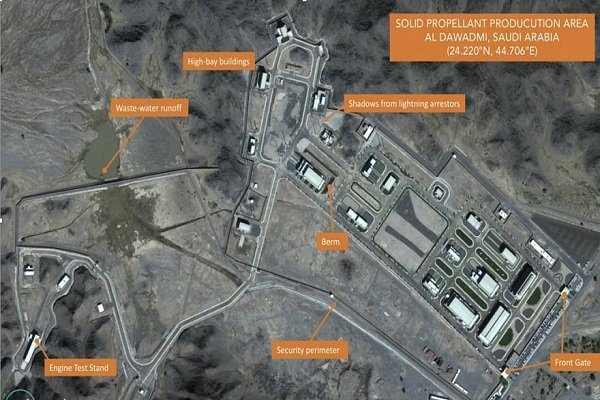By Ramin Hossein Abadian

TEHRAN - The Washington Post recently revealed the existence of the possible production of ballistic missiles in Saudi Arabia. The newspaper added: “Satellite images suggest that Saudi Arabia has constructed its first known ballistic missile factory, according to weapons experts and image analysts, a development that raises questions about the kingdom’s increasing military and nuclear ambitions under its 33-year-old crown prince.”
The facility is said to be located at the same remote Al-Watah missile base about 200 km southwest of Riyadh which houses foreign-bought missiles in Saudi Arabia's arsenal. A spokesman for the Saudi Embassy in Washington declined to comment on the nature of the facility at the missile base. The Pentagon, State Department and CIA also declined to comment.
Also, the Associated Press said in a report that a military base deep inside Saudi Arabia appears to be testing and possibly manufacturing ballistic missiles, experts and satellite images suggest. This is evidence of the type of weapons program it has long criticized Iran for possessing.
History of Saudi Arabia missile program
The Saudi Strategic Missile Force dates to the 1980s, when Prince Khalid bin Sultan — then commander of the Air Defense Force — traveled to China to purchase Dongfeng (DF-3) ballistic missiles. The Dong Feng 3 is also medium-range and nuclear-capable, but it uses liquid fuel and is not very mobile.
In 1999, Prince Sultan, then the defense minister, visited Kahuta Research Laboratories in Pakistan where A.Q. Khan was enriching uranium and building copies of North Korea’s Nodong missile.
Who helped Saudi Arabia?
Meanwhile, China is seen as a possible help for the Saudis and a ballistic missile manufacturing plant. China has always been among the parties to sign contracts and military agreements on ballistic missiles with Saudi Arabia.
Pakistan is also referred to as another country that has helped Saudi Arabia. It is said that China has already supported Pakistan with regard to a ballistic missile manufacturing plant, and now Islamabad has enough expertise and knowledge to build one.
It is important to note that Saudi missile purchases, and in particular the availability of missiles capable of carrying nuclear warheads, show Saudi intentions.
It is important to note that Saudi missile purchases, and in particular the availability of missiles capable of carrying nuclear warheads, show Saudi intentions.
Nuclear ambitions on the agenda
The Saudi move to manufacture ballistic missiles is directly related to the nuclear ambitions of its officials, and in particular Muhammad bin Salman.
Saudi Arabia does not possess nuclear weapons, so any missiles produced at any factory are likely to a prelude to the acquisition of nuclear weapons. The International Center for Peace Studies (IPSC), with its publication of an article on this subject, emphasizes that the Saudi missile program is linked to Mohammed bin Salman's nuclear ambitions.

No comments:
Post a Comment